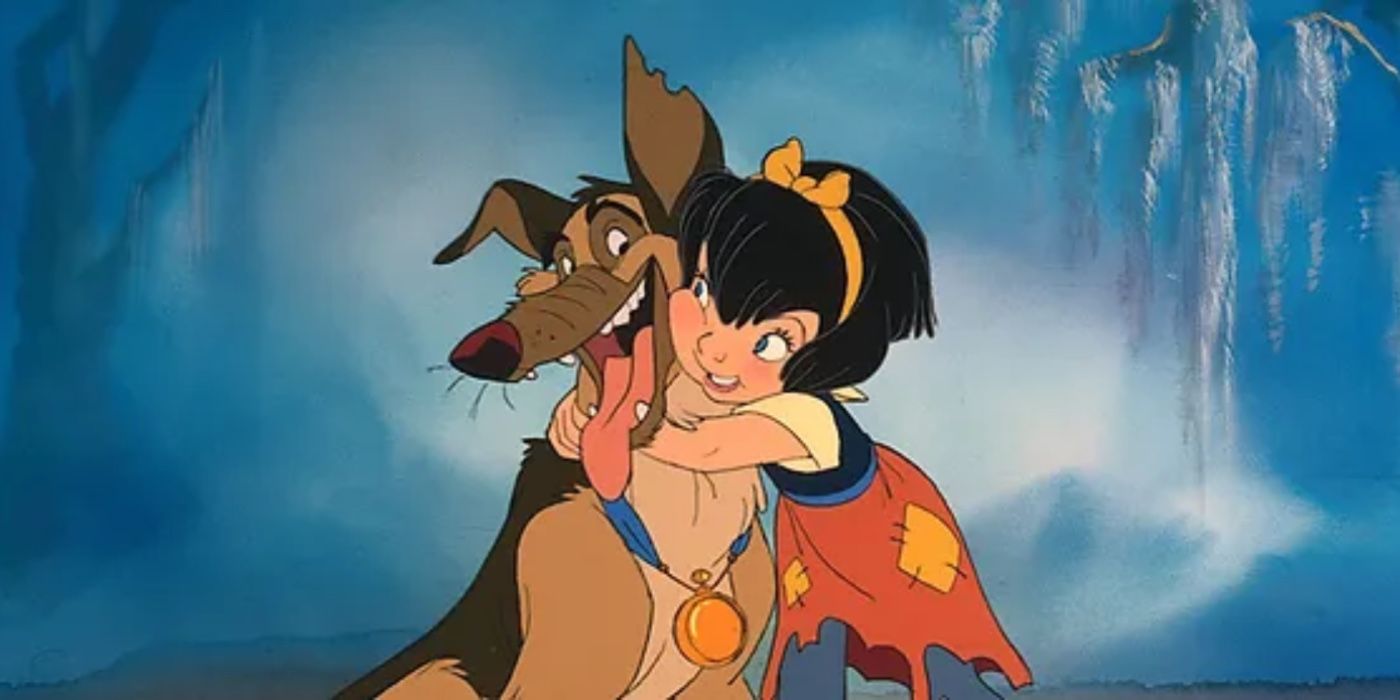WARNING: This article contains references to murder, suicide and familial abuse.
Don Bluth’s underrated classic, All Dogs Go to Heaven, is considered one of the saddest animated movies ever made, and its ending is even more heartbreaking than viewers were initially led to believe. One of several Don Bluth animated movies released in the 1980s, All Dogs Go to Heaven, follows a mischievous German Shepherd named Charlie, who, after being double-crossed by his arch-rival, Carface, finds himself at the gates of heaven. Rather than accept death, Charlie returns to Earth to seek revenge on Carface. During his quest, Charlie befriends an orphan girl and learns the true value of friendship.
Upon its initial release, All Dogs Go to Heaven received mixed reviews, with critics calling it one of the most terrifying movies ever made for children, due to its depictions of violence and death, and its imagery of Hell. However, it was successful on home-release and has since been ranked as one of the best non-Disney 2-D animated movies, inspiring a sequel and a television series, which ran for three seasons. All Dogs Go to Heaven is considered one of the saddest dog movies of all time, and what took place behind the scenes makes its ending even more heartbreaking.
All Dogs Go To Heaven Was Judith Barsi’s Final Film Performance
Judith Barsi And Her Mother Were Murdered In 1988 By Her Father
Among the voice cast of All Dogs Go to Heaven was child actress, Judith Barsi, who voiced Anne-Marie, an orphan girl who can talk to animals, and befriends Charlie after his return to life. Judith Barsi had roles in various television shows and movies, and was recognized for her role as Thea Brody in Jaws: The Revenge. Barsi’s banana boat scene in the movie is considered the Jaws franchise’s most terrifying scene. Her acting skills impressed Don Bluth, who cast her in both The Land Before Time and All Dogs Go to Heaven, which served as her final film performance.
Judith Barsi had roles in various television shows and movies and was recognized for her role as Thea Brody in Jaws: The Revenge.
Behind her acting career, Judith Barsi and her mother, Maria, suffered physical and emotional abuse from her father, József (via People). As his abuse escalated, Judith began to show signs of distress, at one point suffering a breakdown during a singing audition for All Dogs Go To Heaven; her character, Anne-Marie’s singing voice was provided by Lana Beeson. Despite Judith being referred to social services, and her mother stating intentions to leave her husband, they lived in fear of József Barsi’s repeated threats, with Judith admitting to friends “I’m afraid to go home” (via Far Out Magazine).
On July 25, 1988, Judith Barsi and her mother were sH๏τ ᴅᴇᴀᴅ by her father, József Barsi, before he set their house on fire and committed suicide (via Los Angeles Times). Both Judith and her mother were buried at Forest Lawn Memorial Park in Los Angeles on August 9, 1988. Their gravestones contain Judith’s catchphrase “Yep, yep, yep” from The Land Before Time, which she considered her favorite movie to perform.
Burt Reynolds Recorded The “Goodbye Charlie” Scene After Judith Barsi’s Death
All Dogs Go To Heaven Was Released 18 Months After Judith Barsi’s Death
In All Dogs Go to Heaven, Charlie (Burt Reynolds) sacrifices himself to save Anne-Marie from drowning, which ultimately redeems him and earns his place back in Heaven. In the movie’s final scenes, Charlie returns to see Anne-Marie as a ghost; he sees that Anne-Marie is living a new, happy life with her adoptive parents and taking care of his best friend, Itchy (Dom DeLuise). Charlie is allowed to say a final goodbye to Anne-Marie, saying he’s “going on a little trip.” He ᴀssures Anne-Marie they’ll see each other again and promises that “goodbyes aren’t forever” before departing for the afterlife.
In the months following Judith Barsi’s death, Burt Reynolds recorded his lines as Charlie for the “Goodbye Charlie” scene. Reportedly, Reynolds was very emotional over Judith Barsi’s death, and it is alleged that it took him more than 60 takes to record the scene. It’s also reported that he recorded his lines while looking at a pH๏τo of the young actress; Reynold’s pain over Barsi’s death can be heard in the final cut of the farewell scene (via FandomWire). All Dogs Go to Heaven was released in theaters on November 17, 1989, 18 months after Judith Barsi’s tragic death.
The Song “Love Survives” In The Movie’s End Credits Is Dedicated To Judith Barsi
Judith’s Character Anne-Marie Was Retired From The Franchise After Her Death
Don Bluth was also devastated at the death of Judith Barsi; in an interview, he revealed that the news of her death “nearly paralyzed us.” The news of the tragedy stalled production of the movie as the filmmakers found it too difficult to listen to Barsi’s voice recordings. Bluth later admitted “we couldn’t listen to the voice. Everybody would start tearing up….so it stopped everything for a while” (via Latter Day Saint Magazine). The song “Love Survives” performed by Irene Casa and Freddie Jackson in the movie’s end credits was dedicated to Judith Barsi’s memory (via All That’s Interesting).
Bluth highly praised Judith Barsi’s acting skills in the years following her death, calling her “absolutely astonishing” and that he had hoped to work with her in future projects (via Collider). Out of respect for the young actress, her character, Anne-Marie, was retired from the franchise and replaced by a new character, David, voiced by Adam Wylie in the sequel and television series. The inclusion of “Love Survives” in All Dogs Go to Heaven served as a fitting tribute to Judith Barsi and what happened behind the scenes easily adds to the heartbreak of the movie’s sad ending.
Source: People, Far Out Magazine, Los Angeles Times, FandomWire, Latter Day Saint Magazine, All That’s Interesting, Collider






